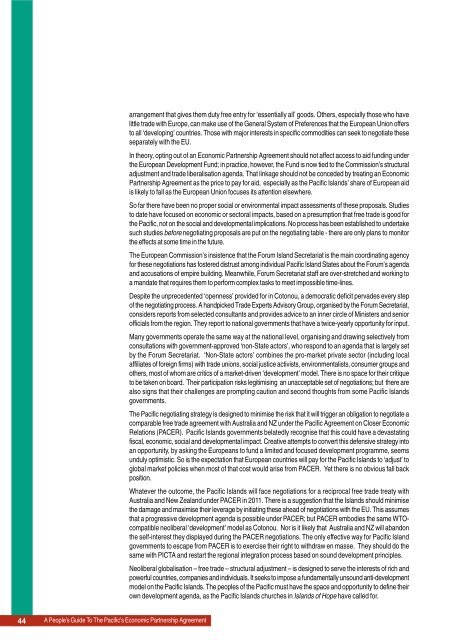REPA Booklet - Stop Epa
REPA Booklet - Stop Epa
REPA Booklet - Stop Epa
Create successful ePaper yourself
Turn your PDF publications into a flip-book with our unique Google optimized e-Paper software.
arrangement that gives them duty free entry for ‘essentially all’ goods. Others, especially those who have<br />
little trade with Europe, can make use of the General System of Preferences that the European Union offers<br />
to all ‘developing’ countries. Those with major interests in specific commodities can seek to negotiate these<br />
separately with the EU.<br />
In theory, opting out of an Economic Partnership Agreement should not affect access to aid funding under<br />
the European Development Fund; in practice, however, the Fund is now tied to the Commission’s structural<br />
adjustment and trade liberalisation agenda. That linkage should not be conceded by treating an Economic<br />
Partnership Agreement as the price to pay for aid, especially as the Pacific Islands’ share of European aid<br />
is likely to fall as the European Union focuses its attention elsewhere.<br />
So far there have been no proper social or environmental impact assessments of these proposals. Studies<br />
to date have focused on economic or sectoral impacts, based on a presumption that free trade is good for<br />
the Pacific, not on the social and developmental implications. No process has been established to undertake<br />
such studies before negotiating proposals are put on the negotiating table - there are only plans to monitor<br />
the effects at some time in the future.<br />
The European Commission’s insistence that the Forum Island Secretariat is the main coordinating agency<br />
for these negotiations has fostered distrust among individual Pacific Island States about the Forum’s agenda<br />
and accusations of empire building. Meanwhile, Forum Secretariat staff are over-stretched and working to<br />
a mandate that requires them to perform complex tasks to meet impossible time-lines.<br />
Despite the unprecedented ‘openness’ provided for in Cotonou, a democratic deficit pervades every step<br />
of the negotiating process. A handpicked Trade Experts Advisory Group, organised by the Forum Secretariat,<br />
considers reports from selected consultants and provides advice to an inner circle of Ministers and senior<br />
officials from the region. They report to national governments that have a twice-yearly opportunity for input.<br />
Many governments operate the same way at the national level, organising and drawing selectively from<br />
consultations with government-approved ‘non-State actors’, who respond to an agenda that is largely set<br />
by the Forum Secretariat. ‘Non-State actors’ combines the pro-market private sector (including local<br />
affiliates of foreign firms) with trade unions, social justice activists, environmentalists, consumer groups and<br />
others, most of whom are critics of a market-driven ‘development’ model. There is no space for their critique<br />
to be taken on board. Their participation risks legitimising an unacceptable set of negotiations; but there are<br />
also signs that their challenges are prompting caution and second thoughts from some Pacific Islands<br />
governments.<br />
The Pacific negotiating strategy is designed to minimise the risk that it will trigger an obligation to negotiate a<br />
comparable free trade agreement with Australia and NZ under the Pacific Agreement on Closer Economic<br />
Relations (PACER). Pacific Islands governments belatedly recognise that this could have a devastating<br />
fiscal, economic, social and developmental impact. Creative attempts to convert this defensive strategy into<br />
an opportunity, by asking the Europeans to fund a limited and focused development programme, seems<br />
unduly optimistic. So is the expectation that European countries will pay for the Pacific Islands to ‘adjust’ to<br />
global market policies when most of that cost would arise from PACER. Yet there is no obvious fall back<br />
position.<br />
Whatever the outcome, the Pacific Islands will face negotiations for a reciprocal free trade treaty with<br />
Australia and New Zealand under PACER in 2011. There is a suggestion that the Islands should minimise<br />
the damage and maximise their leverage by initiating these ahead of negotiations with the EU. This assumes<br />
that a progressive development agenda is possible under PACER; but PACER embodies the same WTOcompatible<br />
neoliberal ‘development’ model as Cotonou. Nor is it likely that Australia and NZ will abandon<br />
the self-interest they displayed during the PACER negotiations. The only effective way for Pacific Island<br />
governments to escape from PACER is to exercise their right to withdraw en masse. They should do the<br />
same with PICTA and restart the regional integration process based on sound development principles.<br />
Neoliberal globalisation – free trade – structural adjustment – is designed to serve the interests of rich and<br />
powerful countries, companies and individuals. It seeks to impose a fundamentally unsound anti-development<br />
model on the Pacific Islands. The peoples of the Pacific must have the space and opportunity to define their<br />
own development agenda, as the Pacific Islands churches in Islands of Hope have called for.<br />
44<br />
A People’s Guide To The Pacific’s Economic Partnership Agreement
















